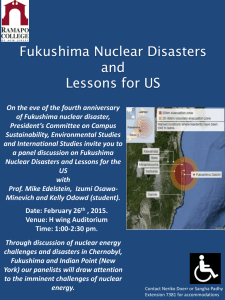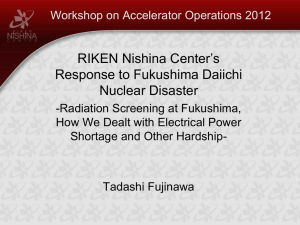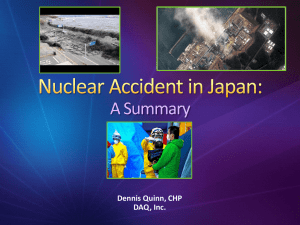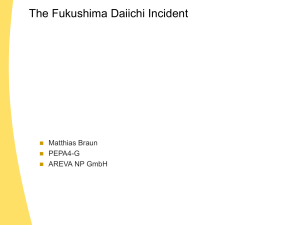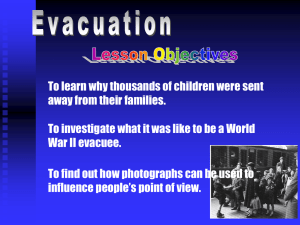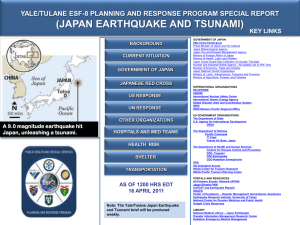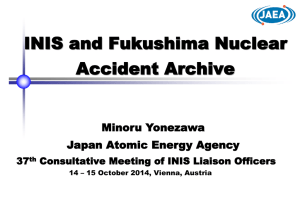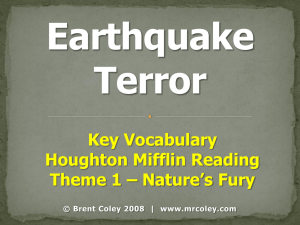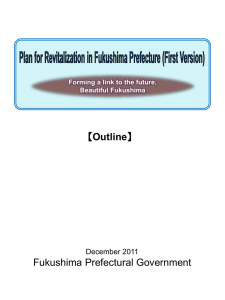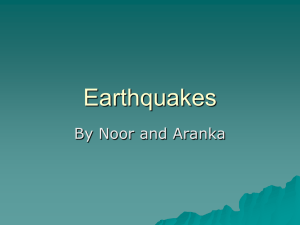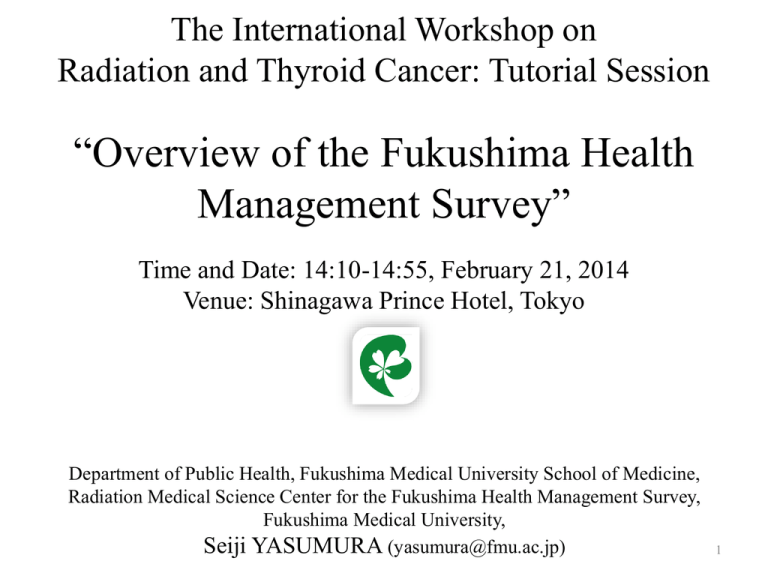
The International Workshop on
Radiation and Thyroid Cancer: Tutorial Session
“Overview of the Fukushima Health
Management Survey”
Time and Date: 14:10-14:55, February 21, 2014
Venue: Shinagawa Prince Hotel, Tokyo
Department of Public Health, Fukushima Medical University School of Medicine,
Radiation Medical Science Center for the Fukushima Health Management Survey,
Fukushima Medical University,
Seiji YASUMURA (yasumura@fmu.ac.jp)
1
Today’s topic
1. Overview of the Great East Japan Earthquake
in Fukushima
2. Situation of evacuation and evacuees
3. Overview of the Fukushima Health
Management Survey
4. Concluding Comments
2
Today’s topic
1. Overview of the Great East Japan Earthquake
in Fukushima
2. Situation of evacuation and evacuees
3. Overview of the Fukushima Health
Management Survey
4. Concluding Comments
3
“Great East Japan Earthquake”
Triple
Disasters
in
Fukushima
1,652 deaths were “disaster-related deaths”.
No one died due to radiation due to NPP accident.
1,603 died and 207 are still lost due to Earthquake and/or Tsunami.
Earthquake
Fukushima City
Tsunami
Minami-soma City
Nuclear Power
Plant Accident
Fukushima Dai-ichi
4
Nuclear Power Plant
Today’s topic
1. Overview of the Great East Japan Earthquake
in Fukushima
2. Situation of evacuation and evacuees
3. Overview of the Fukushima Health
Management Survey
4. Concluding Comments
5
Number of residents who
were living in evacuation
area: 210,000
(March 11, 2011)
Number of evacuees
(including Voluntary
evacuees)
・Inside Fukushima Prefecture:
88,416
・Outside Fukushima Prefecture:
48,364
Total: 136,780
(January, 16, 2014)
6
Direct deaths/Disaster-related deaths
Direct
deaths
Disaster-related
deaths
Iwate
Miyagi
Fukushima
4,673
9,537
1,607
434
879
1,656
(“Asahi Shinbun”, 20, Feb., 2014)
7
Excess mortality among relocated institutionalized elderly
after the Fukushima Daiichi NPP accident
Accident
Occurred.
Excess mortality
Yasumura S, Goto A, Yamazaki S, Reich MR. Excess mortality among relocated institutionalized elderly
after the Fukushima nuclear disaster. Public Health 127: 186-188, 2012.
8
Evacuees outside Fukushima Prefecture
福島県外への避難状況一覧
北海道
青森県
岩手県
宮城県
秋田県
Yamagata
茨城県
栃木県
群馬県
埼玉県
千葉県
Tokyo
神奈川県
Niigata
富山県
石川県
福井県
山梨県
長野県
岐阜県
静岡県
愛知県
三重県
1,802
550
538
2,328
925
9,513
3,943
2,948
1,688
3,820
3,313
7,449
2,449
5,724
243
350
243
710
1,003
228
823
795
213
滋賀県
京都府
大阪府
兵庫県
奈良県
和歌山県
鳥取県
島根県
岡山県
Hiroshima
山口県
徳島県
香川県
愛媛県
高知県
福岡県
佐賀県
Nagasaki
熊本県
大分県
宮崎県
鹿児島県
Okinawa
Total
(Feb. 2, 2013)
(単位 人)
229
702
734
604
106
54
133
107
339
322
83
40
45
106
63
353
134
89
98
176
134
148
738
57,135
青森県
550
秋田県
925
北海道
1,802
岩手県
538
Yamagata
9,513
石川県
350
富山県
243
宮城県
2,328
Niigata
5,724
福井県
243
京都府 滋賀県
702
229
鳥取県
133
島根県
107
Nagasaki
89
岡山県
Hiroshima 339
322
佐賀県 福岡県
134
353
兵庫県
604
岐阜県
228
愛知県
795
大分県
熊本県 176
98
宮崎県
134
香川県
45
愛媛県
鹿児島県 106
148
栃木県
2,948
茨城県
3,943
埼玉県
3,820
千葉県
3,313
静岡県
823
山梨県
710
山口県 83
徳島県
40
長野県
1,003
群馬県
1,688
Tokyo
7,449
神奈川県
2,449
三重県
213
奈良県
106
和歌山県
大阪府
54
734
高知県
63
(Radiation Medical Center for the Fukushima Health Management Survey, Fukushima Medical University)
Okinawa
738
※都道府県名に併記している数字は
各都道府県への避難者数。
9
Evacuees outside Fukushima Prefecture
福島県外への避難状況一覧
北海道
青森県
岩手県
宮城県
秋田県
Yamagata
茨城県
栃木県
群馬県
埼玉県
千葉県
Tokyo
神奈川県
Niigata
富山県
石川県
福井県
山梨県
長野県
岐阜県
静岡県
愛知県
三重県
1,668
472
538
2,514
779
5,708
3,738
2,922
1,459
2,797
3,333
6,583
2,117
4,640
207
302
196
649
921
219
750
747
220
滋賀県
京都府
大阪府
兵庫県
奈良県
和歌山県
鳥取県
島根県
岡山県
Hiroshima
山口県
徳島県
香川県
愛媛県
高知県
福岡県
佐賀県
Nagasaki
熊本県
大分県
宮崎県
鹿児島県
Okinawa
Total
(Jan. 16, 2014)
(単位 人)
197
625
613
538
97
39
119
99
319
241
86
40
50
89
49
329
104
85
108
127
136
125
670
48,364
青森県
472
秋田県
779
北海道
1,668
岩手県
538
Yamagata
5,708
石川県
302
富山県
207
宮城県
2,514
Niigata
4,640
福井県
196
京都府 滋賀県
625
197
鳥取県
119
島根県
99
Hiroshima岡山県
319
241
福岡県
329
佐賀県
104
兵庫県
538
長野県
921
徳島県
40
大分県
熊本県 127
108
宮崎県
136
香川県
50
鹿児島県
125
愛媛県
89
57,135 (Feb. 2, 2013)
(Radiation Medical Center for the Fukushima Health Management Survey, Fukushima Medical University)
高知県
49
栃木県
2,922
茨城県
3,738
埼玉県
2,797
岐阜県
219
愛知県
747
千葉県
3,333
静岡県
750
山梨県
649
山口県 86
Nagasaki
85
群馬県
1,459
Tokyo
6,583
神奈川県
2,117
三重県
220
奈良県
97
和歌山県
大阪府
39
613
Okinawa
670
※都道府県名に併記している数字は
各都道府県への避難者数。
10
Today’s topic
1. Overview of the Great East Japan Earthquake
in Fukushima
2. Situation of evacuation and evacuees
3. Overview of the Fukushima Health
Management Survey
4. Concluding Comments
11
Objectives of
the Fukushima Health Management Survey
1. To monitor residents’ long-term health and to
promote their future well-being.
2. To confirm whether a long-term low-dose
radiation exposure has an effect on health.
12
13
Today’s topic
1. Overview of the Great East Japan Earthquake
in Fukushima
2. Situation of evacuation and evacuees
3. Overview of the Fukushima Health
Management Survey: Basic survey
4. Concluding Comments
14
15
Table 1 Estimated external radiation doses (preceding and full-scale survey)
16
Today’s topic
1. Overview of the Great East Japan Earthquake
in Fukushima
2. Situation of evacuation and evacuees
3. Outline and result of the Fukushima Health
Management Survey: Thyroid ultrasound
examination
Please wait a little!
4. Concluding Comments
Professor Suzuki
will present
tommorow!!
17
Today’s topic
1. Overview of the Great East Japan Earthquake
in Fukushima
2. Situation of evacuation and evacuees
3. Overview of the Fukushima Health
Management Survey: Comprehensive health
check
4. Concluding Comments
18
19
The comprehensive health check in Date City
20
21
Results
The proportion of abnormal test results (obesity,
glucose metabolism, lipid metabolism and liver
function) was higher in the study population
compared with the reference populations; the trend
was more pronounced in males.
This may be due to possible lifestyle changes
(such as less exercise and excessive alcohol
consumption) caused by psychological distress and
sleeping disorder after forced evacuation.
22
Today’s topic
1. Overview of the Great East Japan Earthquake
in Fukushima
2. Situation of evacuation and evacuees
3. Overview of the Fukushima Health
Management Survey: The mental health and
lifestyle survey
4. Concluding Comments
23
24
The mental health and lifestyle survey
Subjects
Age criteria
Adults Born before April 1, 1995
Mental health items
・K6 (Kessler, 2003)
(include High school student ・PCL (PTSD Checklist
on March 11, 2011)
Stressor Specific Version,
Weathers, 1994)
Children Born after April 2, 1995, and ・SDQ (Strengths and
before April 1, 1998 (Junior Difficulties Questionnaire)
(3)
high school student on
March 11, 2011)
Method
Selfadministered
Partially selfadministered
Parents
Children Born after April 2, 1998, and ・SDQ (Strengths and
before April 1, 2004 Difficulties Questionnaire) answer
(2)
(Primary school student on
March 11, 2011)
Children Born after April 2, 2004, and
before March 11, 2011
(1)
(Before primary school
student on March 11, 2011)
Parents
・SDQ (Strengths and
Difficulties Questionnaire) answer
for children aged 4 years
and older
25
26
Total
K6 in total population
↑
↑
Number
Total score
Male
K6 by sex
↑
↑
Female
Number
Male
Female
↑
↑
Total score
Figure Distribution of K6 (Press release, 11, Sep, 2012)
27
Today’s topic
1. Overview of the Great East Japan Earthquake
in Fukushima
2. Situation of evacuation and evacuees
3. Overview of the Fukushima Health
Management Survey: Pregnancy and birth
survey
4. Concluding Comments
28
29
The pregnancy and birth survey
15,972
Subjects
Mid-wife, Doctors
Telephone
consultation if needed
E-mail /Telephone
consultation
Send a questionnaire
Letter of thanks
Feedback of the
consultation
Transmit the
information
Check
questionnaire
Data company
Order of
data entry
Confirm the answers, especially items
of depression, and decide whether
telephone consultation is needed or not
Report of
the result
Research Office
30
Result of the 2011 survey
1. Response Rates
A total of 15,972 questionnaires were distributed in January 2012
and 9,298 (58.2%) were returned by 31 August 2012
2. Support after the Survey
Invalid answers and spontaneous abortions were excluded, and
telephone counseling was provided by midwives and public health
nurses for respondents who were identified as respondents
requiring support on the basis of the survey.
The proportion of miscarriage in Fukushima Prefecture was
0.79% and that of induced abortion was 0.09% in 2012, no
different from the previous fiscal year. The proportion of
premature delivery in 2012 was 5.86% which was higher than the
31
previous fiscal year (4.75%).
Today’s topic
1. Overview of the Great East Japan Earthquake
in Fukushima
2. Situation of evacuation and evacuees
3. Overview of the Fukushima Health
Management Survey
4. Concluding Comments
32
Concluding Comments
Our greatest achievement:
There are so many problems caused by the nuclear power
plant accident now. Fukushima residents more concerned
about their health than ever and feel anxiety of their own
health.
Under such circumstances, we implemented the presented
multifaceted Fukushima Health Management Survey within
one year after the Great East Japan Earthquake.
In collaboration with:
Hiroshima University, Nagasaki University, Radiation
Effects Research Foundation, National Institute of
Radiological Science, and Fukushima Medical Association.
33
Our best efforts continues;
1. To outreach as many residents as possible.
2. To implement further detailed investigations.
3. To disseminate obtained results.
We hope continued concerns and collaboration by
Hiroshima University and Nagasaki University.
34

